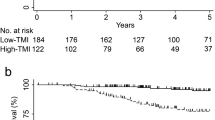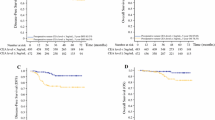Abstract
Purpose
This unicentric, retrospective cohort study aimed to identify the optimal cutoff values of preoperative serum carcinoembryonic antigen (CEA) and carbohydrate antigen 19–9 (CA19-9) for the prognosis in patients with stage II/III colon cancer.
Methods
After excluding 43 patients with CA19-9 levels < 0.2 U/mL, 588 were included. Receiver operating characteristic curves were constructed to determine the optimal cutoff values of CEA and CA 19–9 for disease relapse.
Results
The median CEA and CA19-9 values were 3.6 (interquartile range: 2.1–7.2 ng/mL) and 14.3 (interquartile range: 8.1–30.0) U/mL, respectively. The optimal cutoff values of CEA and CA19-9 were 5.4 ng/mL and 22.4 U/mL, respectively. A multivariate analysis of relapse-free survival (RFS) showed that cancer stage, CEA, and CA19-9 were significant independent factors. The RFS of patients with stages II and III colon cancer was significantly stratified by CEA (< 5.4/ ≥ 5.4 ng/mL) and CA19-9 (< 22.4/ ≥ 22.4 U/mL). Prognostication based on the reference values (< 5.0 ng/mL for CEA and < 37.0 U/mL for CA19-9) was less significant than that based on the optimal cutoff values. Both elevated CEA and CA19-9 had no value dependency on RFS: RFS curves were similar between extremely elevated CEA (≥ 54.0 ng/ml) and intermediate CEA (5.4–54.0 ng/ml) and between extremely elevated CA19-9 (≥ 224.0 U/ml) and intermediate CA19-9 (22.4–224.0 U/ml).
Conclusion
The optimal cutoff values of preoperative CEA and CA19-9 for RFS were 5.4 ng/ml and 22.4 U/mL, respectively, in patients with stages II and III colon cancer. Further relapse risk stratification is possible using these values.






Similar content being viewed by others
References
Ferlay J, Soerjomataram I, Dikshit R (2015) Cancer incidence and mortality worldwide: sources, methods and major patterns in GLOBOCAN 2012. Int J Cancer 136(5):E359–E386
Nagai H, Yuasa N, Takeuchi E et al (2018) The mean corpuscular volume as a prognostic factor for colorectal cancer. Surg Today 48:186–194
Gao Y, Wang J, Zhou Y, Sheng S, Qian SY, Huo X (2018) Evaluation of serum CEA, CA19-9, CA72-4, CA125 and ferritin as diagnostic markers and factors of clinical parameters for colorectal cancer. Sci Rep 8(1):2732
McCall JL, Black RB, Rich CA et al (1994) The value of serum carcinoembryonic antigen in predicting recurrent disease following curative resection of colorectal cancer. Dis Colon Rectum 37(9):875–881
Compton C, Fenoglio-Preiser CM, Pettigrew N et al (2000) American joint committee on cancer prognostic factors consensus conference: colorectal working group. Cancer 88:1739–57
Thirunavukarasu P, Talati C, Munjal S et al (2015) Effect of Incorporation of pretreatment serum carcinoembryonic antigen levels into AJCC staging for colon cancer on 5-year survival. JAMA Surg 150(8):747–755
Matsumoto I, Murakami Y, Shinzeki M et al (2015) Proposed preoperative risk factors for early recurrence in patients with resectable pancreatic ductal adenocarcinoma after surgical resection: a multi-center retrospective study. Pancreatology 15(6):674–680
Lois AD, Vincent PG, Hanne DH et al (2018) Systematic review on the role of serum tumor markers in the detection of recurrent pancreatic cancer. HPB (Oxford) 20(4):297–304
Song Y-x, Huang X-Z, Gao P, et al (2015) Clinicopathologic and prognostic value of serum carbohydrate antigen 19-9 in gastric cancer: a meta-analysis. Dis Markers. 549843. https://doi.org/10.1155/2015/549843
Kambara Y, Miyake H, Nagai H et al (2020) CA19-9 is a significant prognostic marker of patients with stage III gastric cancer. Eur J Surg Oncol 46:1918–1924. https://doi.org/10.1016/j.ejso.2020.05.003
Sato H, Maeda K, Sugihara K et al (2011) High-risk stage II colon cancer after curative resection. J Surg Oncol 104(1):45–52. https://doi.org/10.1002/jso.21914
Giessen-Jung C, Nagel D, Glas M et al (2015) Preoperative serum markers for individual patient prognosis in stage I-III colon cancer. Tumour Biol 36(10):7897–7906. https://doi.org/10.1007/s13277-015-3522-z
Shibutani M, Maeda K, Nagahara H et al (2014) Significance of CEA and CA19-9 combination as a prognostic indicator and for recurrence monitoring in patients with stage II colorectal cancer. Anticancer Res 34(7):3753–3758
Wang J, Wang X, Yu F et al (2015) Combined detection of preoperative serum CEA, CA19-9 and CA242 improve prognostic prediction of surgically treated colorectal cancer patients. Int J Clin Exp Pathol 8(11):14853–14863
Ozawa T, Ishihara S, Kawai K et al (2016) Prognostic significance of preoperative serum carbohydrate antigen 19±9 in patients with stage IV colorectal cancer. Clin Colorectal Cancer 15:e157±e163
Jiang H, Tang E, Xu D et al (2017) Development and validation of nomograms for predicting survival in patients with non-metastatic colorectal cancer. Oncotarget 8(18):29857–29864. https://doi.org/10.18632/oncotarget.16167
Lee JH, Lee JL, Park IJ et al (2017) Identification of recurrence-predictive indicators in stage I colorectal cancer. World J Surg 41(4):1126–1133. https://doi.org/10.1007/s00268-016-3833-2
Nozawa H, Ishihara S, Kawai K et al (2017) A high preoperative carbohydrate antigen 19–9 level is a risk factor for recurrence in stage II colorectal cancer. Acta Oncol 56(5):634–638. https://doi.org/10.1080/0284186X.2016.1257866
Shin JK, Kim HC, Lee WY et al (2019) High preoperative serum CA 19–9 levels can predict poor oncologic outcomes in colorectal cancer patients on propensity score analysis. Ann Surg Treat Res 96(3):107–115. https://doi.org/10.4174/astr.2019.96.3.107
Behbehani AI, Al-Sayer H, Farghaly M et al (2000) Prognostic significance of CEA and CA 19–9 in colorectal cancer in Kuwait. Int J Biol Markers 15(1):51–55
Reiter W, Stieber P, Reuter C et al (2000) Multivariate analysis of the prognostic value of CEA and CA 19–9 serum levels in colorectal cancer. Anticancer Res 20(6D):5195–5198
Hofmann D, Nagel D, Lau-Werner U, et al (2007) Prognosis in non-metastatic colorectal cancer: multivariate evaluation of preoperative levels of six tumor markers in addition to clinical parameters. Lab Med. p. 76
Koprowski H, Brockhaus M, Blaszczyk M et al (1982) Lewis blood-type may affect the incidence of gastrointestinal cancer. Lancet 8285:1332–1333
Narimatsu H, Iwasaki H, Nakayama F et al (1998) Lewis and secretor gene dosages affect CA19 -9 and DU-PAN-2 serum levels in normal individuals and colorectal cancer patients. Cancer Res 58:512–518
Hamada E, Taniguchi T, Baba S et al (2012) Investigation of unexpected serum CA19-9 elevation in Lewis-negative cancer patients. Ann Clin Biochem 49:266–272
Hashiguchi Y, Muro K, Saito Y et al (2019) Japanese Society for cancer of the colon and rectum. Japanese Society for Cancer of the Colon and Rectum (JSCCR) Guidelines 2019 for the Treatment of Colorectal Cancer. Int J Clin Oncol 25:1–42
Sobin L, Gospodarowicz ML, Wittekind Ch (2010) TNM classification of malignant tumors. Wiley, New York
Kanda Y (2013) Investigation of the freely available easy-to-use software ‘EZR’ for medical statistics. Bone Marrow Transplant 48:452–458
Huh JW, Oh BR, Kim HR, Kim YJ (2010) Preoperative carcinoembryonic antigen level as an independent prognostic factor in potentially curative colon cancer. J Surg Oncol 101(5):396–400
Kirat HT, Ozturk E, Lavery IC et al (2012) The predictive value of preoperative carcinoembryonic antigen level in the prognosis of colon cancer. Am J Surg 204(4):447–452
Amri R, England J, Bordeianou LG et al (2016) Risk stratification in patients with stage II colon cancer. Ann Surg Oncol 23(12):3907–3914
Becerra AZ, Probst CP, Tejani MA et al (2016) (2016) Evaluating the prognostic role of elevated preoperative carcinoembryonic antigen levels in colon cancer patients: results from the National Cancer Database. Ann Surg Oncol 23(5):1554–1561. https://doi.org/10.1245/s10434-015-5014-1
Zhang C, Di J, Jiang B et al (2016) Prognostic factors for patients with stage II colon cancer: results of a prospective study. Int J Colorectal Dis 31(1):123–129
Kim CG, Ahn JB, Jung M et al (2017) Preoperative serum carcinoembryonic antigen level as a prognostic factor for recurrence and survival after curative resection followed by adjuvant chemotherapy in stage III colon cancer. Ann Surg Oncol 24(1):227–235
Takagawa R, Fujii S, Ohta M et al (2008) Preoperative serum carcinoembryonic antigen level as a predictive factor of recurrence after curative resection of colorectal cancer. Ann Surg Oncol 15:3433–3439
Ramphal W, Boeding JRE, van Iwaarden M et al (2019) Serum carcinoembryonic antigen to predict recurrence in the follow-up of patients with colorectal cancer. Int J Biol Markers 34(1):60–68
Park JY, Lee KH (2007) Carcinoembryonic antigen and patterns of recurrence after curative resection of the colorectal cancer. Hepatogastroenterology 54(79):1966–1969
Takakura Y, Ikeda S, Imaoka Y et al (2015) An elevated preoperative serum carbohydrate antigen 19–9 level is a significant predictor for peritoneal dissemination and poor survival in colorectal cancer. Colorectal Dis 17(5):417–425
Acknowledgements
The authors are grateful to Ayumi Shintani, who is a professor of Department of Medical Statistics, Osaka City University Graduate School of Medicine, for suggesting statistical analyses in this paper.
Funding
This work was supported by the Japanese Red Cross Nagoya First Hospital Research Grant to HM. The funder had no role in study design, data collection, data analysis, decision to publish, or preparation of the manuscript.
Author information
Authors and Affiliations
Contributions
All authors contributed to the study conception and design. Material preparation and data collection were performed by Hironori Mizuno, Hideo Miyake, Hidemasa Nagai, Yuichiro Yoshioka, Koji Shibata, Soichiro Asai, Junichi Takamizawa, and Norihiro Yuasa. Analyses were performed by Hironori Mizuno and Norihiro Yuasa. The first draft of the manuscript was written by Hironori Mizuno, and all authors read and approved the manuscript.
Corresponding author
Ethics declarations
Ethics approval
The study protocol was approved by the ethics committee of our hospital, which waived the need for informed consent due to the retrospective nature of the study. All authors certify that this research is entirely original.
Ethical standards
All procedures followed were in accordance with the ethical standards of the responsible committee on human experimentation (institutional and national) and with the Helsinki Declaration of 1964 and later versions.
Consent for publication
This manuscript has not been published or presented elsewhere in part or in entirety and is not under consideration by another journal. We have read and understood your journal’s policies, and we believe that neither the manuscript nor the study violates any of these. All authors have read and approved the manuscript before submission, including the names and order of authors.
Conflict of interest
The authors declare no competing interests.
Additional information
Publisher's note
Springer Nature remains neutral with regard to jurisdictional claims in published maps and institutional affiliations.
Supplementary Information
Below is the link to the electronic supplementary material.
Rights and permissions
About this article
Cite this article
Mizuno, H., Miyake, H., Nagai, H. et al. Optimal cutoff value of preoperative CEA and CA19-9 for prognostic significance in patients with stage II/III colon cancer. Langenbecks Arch Surg 406, 1987–1997 (2021). https://doi.org/10.1007/s00423-021-02236-3
Received:
Accepted:
Published:
Issue Date:
DOI: https://doi.org/10.1007/s00423-021-02236-3




